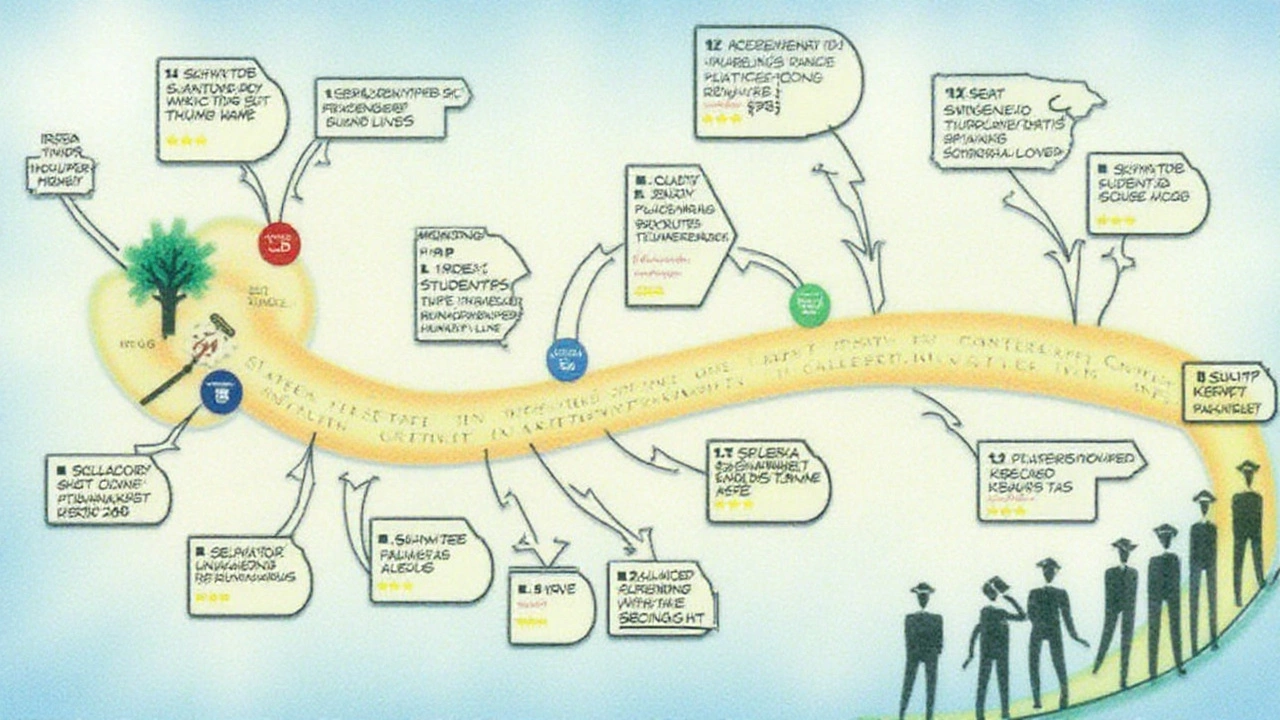
Choosing the right branch at the Indian Institutes of Technology (IIT) is a crucial decision for students aiming for a successful career in engineering. The choice can shape their skill set, job prospects, and future growth opportunities. Among all the prestigious branches, Computer Science Engineering (CSE) frequently takes the top spot.
The appeal of a branch isn't merely derived from high salary packages but is also influenced by the faculty's expertise, research opportunities, and emerging technological trends. For many, the journey starts with the IIT JEE exams, a rigorous entry gate that opens the door to these world-class institutes.
Exploring what makes a particular branch popular can provide a roadmap for aspiring engineers who want to make informed decisions about their educational and professional future.
- Understanding IIT Branches
- Criteria for Ranking
- Popularity of Computer Science Engineering
- Future Trends in Engineering Fields
- Tips for JEE Aspirants
Understanding IIT Branches
The Indian Institutes of Technology (IITs) are a cluster of autonomous public technical universities in India, renowned for their cutting-edge research and sterling academic structure. Each IIT is a world in itself, holding a plethora of branches that cater to diverse engineering and technology sectors. One of the features that set IITs apart is their broad spectrum of engineering branches, which include Computer Science Engineering, Electrical Engineering, Mechanical Engineering, Civil Engineering, and Chemical Engineering, to name a few. Each branch offers distinct coursework and specialization while equipping students with robust knowledge and skills suited to specific career paths in both the traditional and emerging technology sectors.
Understanding each branch's unique culture and curriculum is pivotal for any student aiming to thrive in the IIT ecosystem. Course content, lab work, projects, and internships are designed with inputs from industry leaders, academia, and international collaborators. For instance, the Computer Science Engineering branch, acclaimed for its dynamic curriculum and state-of-the-art facilities, commands immense appeal due to the digital transformation era, demanding a significant number of software developers and IT professionals. The students, therefore, not only receive knowledge but also hands-on experience, preparing them thoroughly for the professional challenges ahead.
According to a report published by the Ministry of Education, 'IITs dominate the landscape of higher technical education in India by consistently producing some of the finest engineers who have a profound impact on society.'
This comprehensive approach differentiates the IIT experience from other institutions, as it promises both depth and breadth in education, ensuring students are industry-ready upon graduation. Data back this up, with IIT students frequently securing prestigious placements and high salary packages. Given these factors, selecting the right branch is essential for students. The choice should reflect their passion and career aspirations, often determined by a mix of personal interest, faculty guidance, and future career trends.
Prospective students should evaluate their options by considering the latest research and industry trends, as well as subjects they are genuinely curious about. Engaging with IIT alumni, faculty, and current students can also offer invaluable insights. This investigation phase is crucial as it helps aspirants to understand not just a branch in isolation but also how it aligns with their long-term goals. Moreover, the decision-making process often benefits from a deeper look into each IIT's specific strengths, as certain campuses like IIT Bombay or IIT Delhi might excel in different fields based on their strategic location and historical focus. In the realm of IIT branches, knowledge truly is power, and channeling this power effectively can pave the way to a remarkable engineering journey.
Criteria for Ranking
When it comes to determining which branch of the illustrious Indian Institutes of Technology (IIT) holds the top spot, several pivotal criteria come into play. These factors provide a comprehensive overview of what makes a branch not just notable, but a beacon for aspiring engineers across the country. Times are changing, and so are the requirements and expectations from different engineering disciplines.
Firstly, placement statistics play a major role. The history of job placements, the range of companies hiring, and the salary packages offered give a branch its prestige. Branches like Computer Science tend to have high placement rates with some of the best packages, engaging students and recruiters alike. Alumni success stories often inspire current students, pushing a branch higher up the desirable ladder.
Additionally, the faculty expertise is a significant factor. A branch with renowned professors and scholars attracts interest due to the quality of education and mentorship. Faculties engaged in cutting-edge research and collaborations with international institutions provide students with invaluable exposure and practical learning experiences. The reputation of professors, especially those who contribute to notable research papers and projects, is integral to a branch’s ranking.
The next criterion involves research opportunities. A branch’s ability to offer pioneering research projects, funded by reputable organizations, speaks volumes about its calibre. Institutes that facilitate student-led research and foster innovation through adequate resources attract ambitious students ready to change the world. "The opportunities for research and innovation at IITs are unparalleled," remarks a professor, emphasizing the institute's commitment to creating a proactive learning environment.
Emergent technological trends also influence a branch’s rank. Branches that align with the current and future demands of the industry, such as AI, robotics, and sustainable energy, gain popularity as students look to chart careers in emerging sectors. This forward-thinking approach ensures that students are industry-ready upon graduation, keeping the branch’s curriculum relevant and dynamic.
Student preferences driven by personal interest and career goals also shape the landscape. Much like any decision, peer influence, perceived difficulty, and personal passion collectively influence a student's choice. Choices are often backed by detailed reports and expert advice available from educational consultancies and online resources that keep aspirants abreast of current trends and potential future shifts in demand.
Considering all these factors collectively, the ranking of a branch is not static and tends to evolve with changing educational trends and technological advancements. Making an informed choice involves understanding these complexities and aligning them with personal career aspirations.

Popularity of Computer Science Engineering
When it comes to choosing a course at the Indian Institutes of Technology, Computer Science Engineering triumphs as the most revered branch. For many aspiring students, the allure of this field lies in its blend of intellectual challenges, diverse career opportunities, and robust demand across industries. From major tech giants like Google and Microsoft to pioneering startups, professionals with a background in CSE find themselves in enviable positions.
Computer Science Engineering has consistently been a popular choice due to its dynamic nature and impact on society. The advent of technologies such as artificial intelligence, machine learning, and blockchain has only amplified the demand for skilled professionals. Students aspiring to join the ranks of top software engineers realize that CSE equips them with the tools to innovate in these cutting-edge areas. Colleges like IIT Bombay, IIT Delhi, and IIT Madras receive thousands of applications from JEE aspirants vying for a limited number of seats in their CSE programs, highlighting the stiff competition and immense popularity.
"Computer Science is not just about computers and programming; it's a discipline that represents a way of thinking and problem-solving that will impact all fields," says Larry Page, co-founder of Google.
Statistics support the popularity of this branch. A look at IIT Bombay's placement reports reveals that CSE students often fetch the highest salaries among their peers, with some packages soaring into the stratospheric range. IIT branches in Computer Science Engineering consistently report 100% placement rates, further cementing its status as a premier choice. Equally appealing is the branch’s adaptability and relevance to global technological advancements, fostering a perpetual demand for engineers equipped with CSE expertise.
Potential students should consider what makes CSE not only appealing but also future-proof. The curriculum continuously evolves to meet industry standards, often including specialized electives such as data science and cybersecurity, ensuring that graduates are well-prepared to tackle tomorrow's challenges. Furthermore, IITs have strong academic-industry connections, enabling internships and projects within top tech firms, which solidifies practical knowledge alongside theoretical learning.
Thus, while the competitiveness and rigorous nature of the program may be daunting, the rewards are equally compelling. Such an environment nurtures creativity and critical thinking, pushing students to explore innovative solutions. For those determined to embark on a journey riddled with opportunity and growth, Computer Science Engineering at an IIT is more than a promise of a solid career—it’s a gateway to shaping the future.
Future Trends in Engineering Fields
The world of engineering is continuously evolving, driven by technological advancements, global challenges, and innovations that redefine industries. Among the key emergent areas, Artificial Intelligence (AI) has grown exponentially, influencing numerous facets of technology development. Engineers venturing into AI are tasked with developing smart systems capable of learning, adapting, and performing tasks previously reserved for human intelligence. The rapid advancements in AI are paving the path for new roles and expanding the horizons for those eyeing Computer Science Engineering.
Another promising trend is the integration of the Internet of Things (IoT) in daily lives, connecting smart devices to create seamless interactivity across various sectors. IoT promises to revolutionize not just consumer electronics but also fields like agriculture, healthcare, and urban planning through smart cities. This trend highlights the importance of branches like Electronics and Communication, once considered traditional, now witnessing a renaissance thanks to this interconnected digital world.
"As technology continues to evolve, engineering fields are becoming more entwined with data-driven applications, prompting a rethink in curriculum and skills," noted Dr. Mehta, a Professor at IIT Bombay.
Climate change and sustainability have thrust Green Engineering into the spotlight. There is a growing demand for engineers who can devise solutions that mitigate environmental impacts. This branch is particularly significant in India, where rapid industrial growth intertwines with environmental sustainability challenges. The demand for innovative sustainable solutions has opened new avenues in Civil and Environmental Engineering, redefining these fields through a green lens.
Emerging Technologies and New Disciplines
Bioengineering and biotechnology are also garnering attention, with breakthroughs in genetics and medical technology. This discipline holds potential for high-impact work, from regenerative medicine to sustainable agricultural practices. The fusion of biological sciences with engineering principles provides a dynamic platform for solving complex biological problems, offering numerous opportunities for future engineers passionate about both realms.
While traditional disciplines remain fundamental, engineering courses are witnessing a shift towards interdisciplinary studies. Dual-degree programs and specialized courses combining aspects of various engineering fields are gaining popularity. These offer flexibility and cater to diverse career paths, preparing students for a versatile future in industries of their choice. This approach encourages students to not only acquire technical skills but also broader problem-solving abilities, making them well-equipped for the demands of tomorrow’s challenges.
| Engineering Field | Future Trend |
|---|---|
| Artificial Intelligence | Machine Learning, Automation |
| IoT | Smart Cities, Connected Devices |
| Green Engineering | Renewable Energy, Sustainable Design |
| Bioengineering | Genetic Engineering, Biomedicine |
In essence, engineering fields are undergoing a transformative era abundant with potential and uncharted territory. The convergence of technology and sustainability is crafting new roles and disciplines, pressing the need for engineers who are adaptable, forward-thinking, and innovative. Aspiring IIT JEE candidates should position themselves at the forefront of these trends, preparing to meet the intricate demands of future industries.

Tips for JEE Aspirants
Embarking on the journey to crack the IIT JEE involves strategic planning, relentless determination, and the right study techniques. Understanding the intricacies of this competitive exam can greatly improve the chances of securing a seat in one of India's top IIT branches like Computer Science Engineering. Applicants should begin by familiarizing themselves with the exam pattern and syllabus. This foundational step ensures that students can optimize their study schedule, dedicating time proportionately to each subject. Many past toppers emphasize the importance of a well-structured timetable, allowing for balanced preparation across Physics, Chemistry, and Mathematics.
Diligent practice cannot be overstated when preparing for the JEE. Regular problem-solving enhances conceptual clarity and boosts confidence. It's recommended to solve previous years' question papers and take timed mock tests. These activities help in understanding the type of questions usually asked and the level of difficulty. Successful candidates often cite that consistent practice helped them manage time effectively during the actual exam, reducing the anxiety of unforeseen questions and scenarios.
Seeking guidance from experienced mentors can significantly aid in preparation. Students are encouraged to join coaching centers or online platforms that provide expert-led classes. These mentors not only clarify doubts but also share strategic insights. According to a well-known JEE coach, "Understanding your mistakes and correcting them early is crucial for improvement." Environments that foster doubt clearing and peer discussions can provide a competitive edge, motivating students to push their limits.
While academic rigor is vital, maintaining a balanced lifestyle is equally important. Physical activity, whether it's a simple walk or a sport, should be incorporated into daily routines to keep the mind fresh and alleviate stress. Nutrition also plays a critical role in maintaining concentration and energy levels during long study hours. Techniques like meditation or yoga can further contribute to mental peace, helping students stay focused amidst mounting pressures.
In the digital age, numerous online resources are available for aspiring engineers. Websites provide instant access to study materials, video lectures, and forums for doubt resolution. However, the key is to use these resources judently. Over-reliance on any single source can be detrimental, thus a diversified approach incorporating books, online content, and interactive sessions is recommended. Students should remember to regularly self-assess and tweak their strategies as needed, ensuring that they are always moving towards the set goal of cracking the IIT JEE.
More Articles

Top IIT Branch in India: A Comprehensive Guide for JEE Aspirants
Selecting the premier branch in IIT can significantly influence a student's career path. Factors like placement statistics, faculty expertise, research output, and student preferences often determine the hierarchy of branches. In India, Computer Science Engineering consistently ranks as the most sought-after branch at IITs. This article delves into what makes a branch the top choice and offers insights for JEE aspirants looking to make an informed decision.

Is Education Better in India or the USA? A CBSE Perspective
Comparing education systems in India and the USA can reveal surprising contrasts and similarities. This article focuses on the CBSE syllabus, evaluating its effectiveness compared to the educational approaches in the USA. Discover the strengths and challenges unique to both countries' systems, and understand factors influencing education quality. Find insights useful for students, parents, and educators navigating these education landscapes.

Toughest American Exam: How Hard Is It Really?
Think the SAT was tough? America’s most brutal exams reach a whole other level. From brain-busting medical boards to nail-biting law tests, find out what tops the list and what it really takes to pass. This article breaks down why these tests are so feared and what you can do to survive them. Get specific tips and stories that actually help, not just vague advice.
